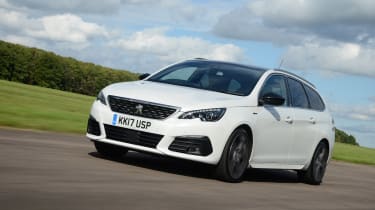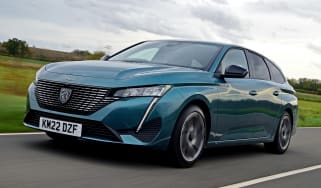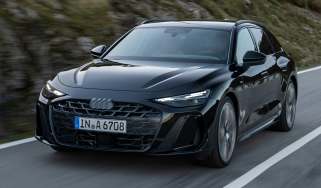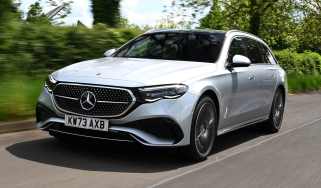Peugeot 308 SW estate review (2014-2021)
"The Peugeot 308 SW is a small estate car with a huge boot, economical engines and plenty of interesting features"
Pros
- Comfortable suspension
- Economical engines
- Spacious boot
Cons
- Not much fun to drive
- Parts of interior still feel a bit cheap
- Some safety kit only on top spec models
The appeal of the Peugeot 308 was broadened by the introduction of this 308 SW (station wagon) estate version. It competes against the SEAT Leon ST, Kia Cee'd SW, Ford Focus Estate and Skoda Octavia Estate, but also rivals more expensive models such as the BMW 5 Series Touring when it comes to sheer load-lugging ability.
This healthy appetite for luggage comes without sacrificing style; and the 308 SW still has much of the restrained elegance of the shorter hatchback model. A facelift in late 2017 brought some minor aesthetic alterations, mainly consisting of a new grille and revised headlights. The 308 SW is also relatively light, which helps it to return impressive fuel economy and show exhibit decent agility on a twisty road.
Peugeot introduced a 1.5-litre BlueHDi diesel engine as part of the 308 SW's most recent facelift, offering an impressive blend of performance and economy. The 1.6-litre diesel was phased out as a result, leaving the 1.5-litre BlueHDi in two different states of tune, with either 99bhp or 129bhp.
The 99bhp version can return up to 63.8mpg, while emitting between 97 and 102/km of CO2 for a 27/28% BiK band, while the more powerful version has an almost identical economy figure and 92-100g/km CO2 emissions. There's also little penalty for choosing the 129bhp with a six-speed automatic gearbox, with economy again rated at 61mpg and CO2 emissions given as 99-110g/km.
More reviews
If power is important to you, an upgrade to the 2.0-litre diesel offers 179bhp, which takes the 308 SW from 0-62mph in under nine seconds. This engine makes the 308 SW a capable tow-car, too, with a maximum-braked trailer capacity of 1,600kg. The range-topping diesel is expensive – you can only choose it in the sporty GT trim, where it comes with an automatic gearbox as standard. It’s also less economical, returning 49.4mpg.
Those who expect to cover fewer than 12,000 miles or so every year may find the 1.2-litre petrol fits the bill. It produces either 109 or 129bhp, and both are claimed to return almost 50mpg with CO2 emissions as low as 113g/km. These are impressive figures for a petrol estate car.
Marking a radical departure from older designs, the 308 SW has a minimalist cabin, with almost every function controlled from a large touchscreen display. Look hard enough and you can still find some scratchy plastics, but most materials are attractive and feel good to touch. It certainly looks much more stylish, but there are a few issues: using the touchscreen even to adjust the air-conditioning is a step too far, especially as it can be slow to respond. Peugeot has also decided to fit a small steering wheel; the idea is to look over it at the gauges, rather than through it, but some drivers report that it obscures the instruments.
Five trim levels are available, with Active the most basic, but still getting DAB radio, Bluetooth, air-conditioning, cruise control, alloy wheels, dual-zone climate control and the 9.7-inch touchscreen. The Allure is more stylish and has front and rear parking sensors, a fixed panoramic roof, folding door mirrors and roof rails. Tech Editions add a host of driver assist and safety systems while GT Line models look faster thanks to a bodykit, 18-inch wheels and twin exhausts, and get some practical extras like a reversing camera. Meanwhile, the GT trim is reserved for the most powerful diesel and petrol engines.
The Peugeot 308 finished exactly 50th out of the 100 cars ranked in our 2019 Driver Power owner satisfaction survey of cars currently on sale in the UK, with impressive levels of reliability reported. It didn’t feature in the top 75 cars in 2018, but the 3008, which has a similar mechanical makeup, was the highest ranked car overall in 2018. The 308 also received the full five stars in Euro NCAP crash-testing, proving it’s impressively safe.
Which Is Best?
Cheapest
- Name1.2 Hybrid 136 Allure 5dr e-DSC6
- Gearbox typeSemi-auto
- RRP£33,065
Most Economical
- Name1.6 Plug-in Hybrid 195 Allure 5dr e-DSC7
- Gearbox typeSemi-auto
- RRP£39,310
Fastest
- Name1.6 Plug-in Hybrid 195 Allure 5dr e-DSC7
- Gearbox typeSemi-auto
- RRP£39,310















